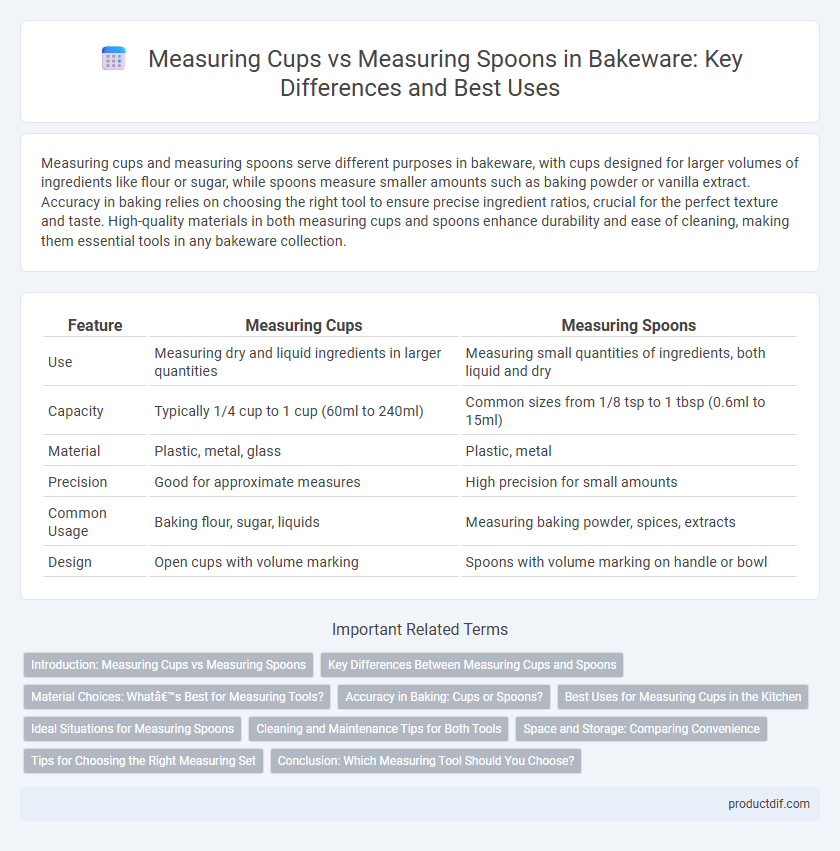Measuring cups and measuring spoons serve different purposes in bakeware, with cups designed for larger volumes of ingredients like flour or sugar, while spoons measure smaller amounts such as baking powder or vanilla extract. Accuracy in baking relies on choosing the right tool to ensure precise ingredient ratios, crucial for the perfect texture and taste. High-quality materials in both measuring cups and spoons enhance durability and ease of cleaning, making them essential tools in any bakeware collection.
Table of Comparison
| Feature | Measuring Cups | Measuring Spoons |
|---|---|---|
| Use | Measuring dry and liquid ingredients in larger quantities | Measuring small quantities of ingredients, both liquid and dry |
| Capacity | Typically 1/4 cup to 1 cup (60ml to 240ml) | Common sizes from 1/8 tsp to 1 tbsp (0.6ml to 15ml) |
| Material | Plastic, metal, glass | Plastic, metal |
| Precision | Good for approximate measures | High precision for small amounts |
| Common Usage | Baking flour, sugar, liquids | Measuring baking powder, spices, extracts |
| Design | Open cups with volume marking | Spoons with volume marking on handle or bowl |
Introduction: Measuring Cups vs Measuring Spoons
Measuring cups are designed to measure larger quantities of dry or liquid ingredients, typically ranging from 1/4 cup to 1 cup, while measuring spoons offer precision for smaller measurements, usually between 1/8 teaspoon and 1 tablespoon. Both tools are essential in baking to ensure accuracy, with measuring cups commonly used for flour, sugar, and liquids, and measuring spoons ideal for spices, baking powder, and extracts. Choosing the right measuring tool affects recipe outcome by maintaining proper ingredient ratios in bakeware preparation.
Key Differences Between Measuring Cups and Spoons
Measuring cups are designed for larger ingredient quantities, typically ranging from 1/4 cup to 1 cup, making them ideal for dry or liquid ingredients like flour and milk. Measuring spoons measure smaller amounts, usually from 1/8 teaspoon to 1 tablespoon, perfect for precise measurements of baking powder, salt, or vanilla extract. The key difference lies in their volume capacity and purpose: cups for bulk measurements and spoons for accuracy in small amounts.
Material Choices: What’s Best for Measuring Tools?
Measuring cups and measuring spoons come in materials like stainless steel, plastic, and glass, each offering distinct advantages for precision and durability. Stainless steel provides corrosion resistance and long-lasting accuracy, while glass enables easy readability and heat tolerance for liquid ingredients. Plastic options are lightweight and affordable but may warp or stain, making stainless steel the preferred choice for professional-quality bakeware measuring tools.
Accuracy in Baking: Cups or Spoons?
Measuring cups provide accurate volume measurements for larger quantities of ingredients, essential for flour, sugar, and liquids in baking recipes. Measuring spoons deliver precise amounts for smaller quantities of potent ingredients like baking powder, spices, or extracts, where even slight variations can affect the outcome. Choosing the right tool depends on the ingredient's quantity and required precision to ensure consistent and successful baked goods.
Best Uses for Measuring Cups in the Kitchen
Measuring cups are essential for accurately portioning larger volumes of dry ingredients like flour, sugar, and grains, as well as liquids such as milk and oil, ensuring consistent baking results. Their sturdy construction and clear volume markings facilitate easy pouring and precise measurement, reducing errors in recipes that demand specific quantities. Ideal for mixing bowls and pots, measuring cups streamline ingredient preparation in both baking and cooking tasks, complementing the detailed precision offered by measuring spoons.
Ideal Situations for Measuring Spoons
Measuring spoons are ideal for accurately portioning small quantities of ingredients such as baking powder, baking soda, salt, and spices, where precision is crucial to recipe success. Their compact size allows for easy measuring of liquids and dry ingredients in amounts ranging from 1/8 teaspoon to 1 tablespoon, essential in baking for consistency and flavor balance. Unlike measuring cups, spoons minimize error in small measurements, ensuring exact ingredient ratios in cookies, cakes, and other delicate baked goods.
Cleaning and Maintenance Tips for Both Tools
Measuring cups and spoons require thorough cleaning after each use to prevent residue buildup, particularly when working with sticky or oily ingredients. Stainless steel and silicone options are easier to clean and typically dishwasher safe, reducing maintenance time and ensuring longevity. Regular inspection for cracks or rust enhances hygiene and maintains accurate measurements.
Space and Storage: Comparing Convenience
Measuring cups typically require more storage space due to their larger size, often necessitating dedicated drawers or shelf areas, while measuring spoons are compact and nest together, making them ideal for small kitchens or limited storage. The ability to stack measuring cups can save some room, but spoons offer superior convenience by occupying minimal space and often featuring keyring attachments for easy organization. Efficient storage solutions for both tools enhance kitchen functionality, with spoons providing a distinct advantage in space optimization.
Tips for Choosing the Right Measuring Set
Choose measuring cups for accurate volume measurements of dry or liquid ingredients in larger quantities, typically ranging from 1/4 cup to 1 cup. Opt for measuring spoons when precise small measurements, such as teaspoons or tablespoons, are essential, especially for spices or leavening agents. Consider materials like stainless steel for durability and look for clear markings to ensure ease of use and accuracy in your baking projects.
Conclusion: Which Measuring Tool Should You Choose?
Measuring cups offer precision for larger volumes, ideal for dry and liquid ingredients, while measuring spoons excel at accuracy for small quantities, essential in baking for spices and leavening agents. Choose measuring cups for flour, sugar, or liquids like milk, and measuring spoons for baking soda, salt, or vanilla extract to ensure consistent recipes. Using the appropriate tool enhances baking accuracy, resulting in better texture and flavor in baked goods.
Measuring cups vs Measuring spoons Infographic

 productdif.com
productdif.com